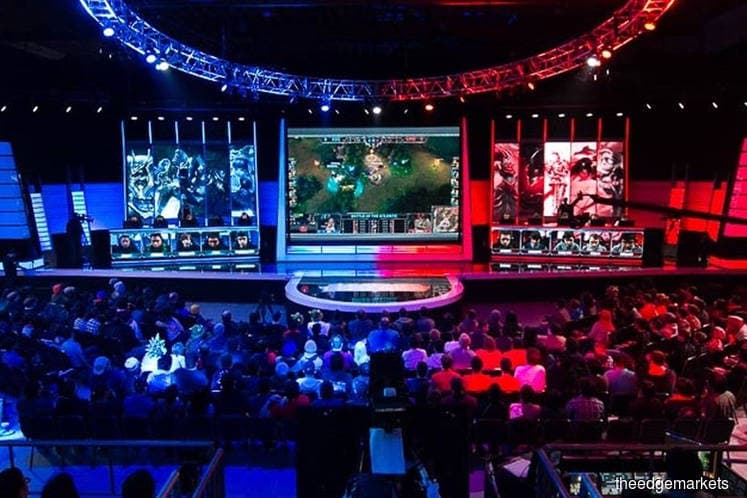
This article first appeared in The Edge Malaysia Weekly on October 9, 2017 - October 15, 2017
AS a professional eSports player, and a member of the Malaysian team that won third place at The International in the US in 2013, Khoo Chong Xin was well aware of the prize pool at stake. The International is the world championship for a PC multiplayer online battle arena (MOBA) game called Dota 2 (short for Defence Of The Ancient).
“We took home about US$120,000 each. We were stupefied by the amount of money we won, especially since most of us came from less affluent families,” Khoo tells The Edge over the telephone.
The total prize pool for the tournament that year, its third iteration, was US$2.87 million. Four years later, the prize pool had grown to US$24.79 million, the highest of all video gaming competitions, which are more commonly called eSports.

Apart from the prize pool, says Khoo’s team manager, Eric Khor, professional eSports players are much like the football players of Manchester United or Liverpool, who draw a monthly salary from their teams. Khoo and Khor are part of team Fnatic.
“Fnatic is a European team, hence player salaries are comparable to other international players, but not all Malaysian players are lucky enough to get this kind of sponsor,” he says in a recent interview.
“People used to have the perception that we just play games, but that is only part of the story,” Khor says.
Khoo, who started playing the game 10 years ago, when he was 13 years old, says his daily training begins at 1pm and ends at about 11pm. During tournament season, the team can be away from home for months.
“Our team is based in Malaysia so, occasionally, I can take time off to see my family but my teammates, who come from other parts of the world, don’t have that luxury,” he says.
Khoo’s teammates include two Swedes, one Filipino and a Canadian.
For convenience sake, professional players usually live in a boot camp or team house, typically located in an upscale neighbourhood, together with their supporting colleagues.
As team manager, Khor says his job is to take care of every aspect of a player’s well-being except for in-game matters, which are the purview of the coach and analyst.
“Typically, a team consists of eight main personnel — a manager, a coach, an analyst and five players. The coach and analyst assist the players in terms of in-game matters. I am responsible for fixing the team’s macro direction, taking care of their daily meals, scheduling their tournaments, flight arrangements, visa applications, monies in and out of the country, basically everything,” Khor says.
However, this does not mean the players have no frustrations. Malaysian Adam Erwann Shah Akhtar Hussein, who plays Dota for a local team called Fire Dragoon, says he has not been home in three weeks.
“There is a lot to keep up with, we have to think about it constantly because of the complexity of the game. Sometimes, things just don’t match up in the game and it costs a lot of time to fix it,” he says.
Aiman Azham, a professional player turned coach for Counter-Strike: Global Offensive, a first-person shooter video game, says he and his players have to think of a new game strategy every day.
“Every morning as we wake up, we have to come up with new ideas because when we take part in a tournament, once the game is being broadcast, the strategy is exposed and studied by competitors or other players,” he says.
These eSports teams are kept running mainly by financial sponsors from either big brand names or gaming enthusiast businessmen.
In Malaysia, video game event specialist Mineski Events Team Sdn Bhd director Firdaus Hashim says that while product sponsors are common locally, many eSports teams or businesses in the ecosystem are struggling to obtain sufficient financial sponsors.
“Compared with mature markets like China and South Korea, Malaysia is still relatively young in terms of eSports,” he says.
“The international teams, yes, their players are earning salaries that are higher than a doctor’s, but a lot of local players are still getting the pay of a fresh graduate.”
Astro Malaysia Holdings Bhd vice-president of Sports Business Lee Choong Khay concurs, adding that more education is required for marketers.
“If the marketers themselves don’t understand eSports, it would be difficult for them to sell the idea,” he says.
Without sufficient sponsors, Fnatic’s Khor says the team would literally have to live on their dreams.
“I remember when we started a few years ago, before Fnatic approached us. We didn’t get paid a salary, only food allowances of RM500 to RM1,000, and we lived above a cybercafé. The cybercafé owner gave us housing because he was a good friend of ours,” he says.
“Things got better when Fnatic came into the picture during a tournament in Romania, when they decided to sign us up. I guess it was a strategic decision for them to expand their footprint in Southeast Asia, because when it comes to Dota 2, Malaysia and the Philippines are the two countries best known for talents,” he says, which is why the team is based here.
Last year, Malaysia ranked 11th among the 111 countries in terms of prize money won, according to E-Sports Earnings, a web portal that tracks players’ winnings globally. Malaysia’s 111 players won total prize money of US$2.11 million, the highest in Southeast Asia.
Save by subscribing to us for your print and/or digital copy.
P/S: The Edge is also available on Apple's AppStore and Androids' Google Play.